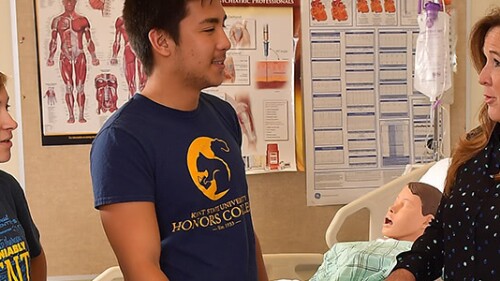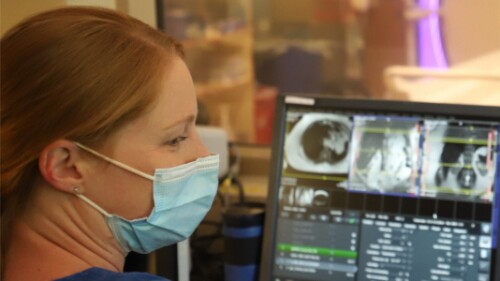
Nursing for Registered Nurses (RN to BSN)
The online Bachelor of Science in Nursing (BSN) for Registered Nurses at Kent State is designed for RNs seeking to advance their education and career opportunities. This program builds on prior nursing experience, offering courses in evidence-based practice, patient care, and healthcare policy. Graduates are prepared to take on leadership roles, pursue specialized nursing fields, or continue their education in graduate nursing programs.
Nursing for Registered Nurses (RN to BSN) Bachelor’s Degree Program Overview
The Bachelor of Science in Nursing degree in Nursing for Registered Nurses is for registered nurses (RN) with a diploma or associate degree who are seeking an accredited bachelor’s degree in nursing. The completer program is offered fully online for part- and full-time students. Expert faculty and administrators work closely with students to equip them to meet the future challenges of professional nursing and influence the future of health care.
Students may apply early to the following master’s degree programs and double count 9 credit hours of graduate courses toward both degree programs. See the Combined Bachelor’s/Master’s Degree Program Policy for more information.
Combined Bachelor’s/Masters Program Options
RN to BSN students may apply early to pursue either a Health Informatics focus or a Master’s in Nursing focus that allows them to take up to three graduate-level courses (9 credits) that substitute for courses in their BSN program. Advisors can help students make the appropriate substitutions. More information.
Program Learning Outcomes
Graduates of this program will be able to:
- Acquire competencies based on professional standards to assume the role of the professional nurse and for career advancement, including graduate studies.
- Apply the nursing process in providing evidence-based, culturally sensitive care to promote health and adaptation of individuals, families, groups and communities.
Program Structure
120 minimum total credit hours: 14-16 credits (4) BSCI or CHEM prerequisite requirement courses, 33 credits (11) BSCI or NURS major requirement courses, 3 credits (1) NURS upper-division elective course, 3-4 credits (1) statistics elective course from list, 28 credits additional requirement courses, 39 credits Associate degree courses and general elective courses.
Accreditation
The B.S.N. degree Nursing for Registered Nurses at Kent State University is accredited by the Commission on Collegiate Nursing Education, 655 K Street, NW, Suite 750, Washington, DC 20001, 202-887-6791.
Nursing for Registered Nurses (RN to BSN) Bachelor’s Degree Program Admissions Requirements
The university affirmatively strives to provide educational opportunities and access to students with varied backgrounds, those with special talents and adult students who graduated from high school three or more years ago.
Admission to the Nursing for Registered Nurses major is selective. Criteria for admission includes the following:
- Evidence of admission in good standing from a state-approved associate degree or diploma nursing program
- Minimum 2.000 overall GPA on a 4.000-point scale
International Students: All international students must provide proof of proficiency of the English language (unless they meet specific exceptions) through the submission of an English language proficiency test score or by completing English language classes at Kent State’s English as a Second Language Center before entering their program. For more information, visit the admissions website for international students.
Important Dates
Program Courses
Program Requirements
| Code | Title | Credit Hours |
|---|---|---|
| Prerequisite Requirements (min C graded required in all courses) | ||
| BSCI 20021 | BASIC MICROBIOLOGY | 3-4 |
| BSCI 30171 | GENERAL MICROBIOLOGY | |
| BSCI 21010 | ANATOMY AND PHYSIOLOGY I (KBS) (KLAB) 1 | 4 |
| BSCI 21020 | ANATOMY AND PHYSIOLOGY II 1 | 4 |
| CHEM 10050 | FUNDAMENTALS OF CHEMISTRY (KBS) | 3-4 |
| CHEM 10055 | MOLECULES OF LIFE (KBS) | |
| CHEM 10060 | GENERAL CHEMISTRY I (KBS) | |
| Major Requirements (courses count in major GPA; minimum C grade required in all courses) | ||
| BSCI 30050 | HUMAN GENETICS | 3 |
| BSCI 30156 | ELEMENTS OF GENETICS | |
| NURS 40075 | INFORMATION AND PATIENT CARE TECHNOLOGY FOR HEALTHCARE PROFESSIONALS 2 | 3 |
| NURS 40873 | INTRODUCTION TO EVIDENCE BASED PRACTICE FOR REGISTERED NURSES 3 | 3 |
| NURS 41000 | CONCEPTS AND ISSUES FOR PROFESSIONAL NURSING PRACTICE | 3 |
| NURS 42000 | LEADERSHIP AND MANAGEMENT FOR PROFESSIONAL NURSING PRACTICE 4 | 3 |
| NURS 43001 | HEALTH PROMOTION IN PROFESSIONAL NURSING PRACTICE (ELR) | 3 |
| NURS 44001 | POPULATION-BASED NURSING FOR PROFESSIONAL NURSING PRACTICE (DIVG) | 3 |
| NURS 45000 | HEALTH MAINTENANCE AND RESTORATION FOR PROFESSIONAL NURSING PRACTICE | 3 |
| NURS 46000 | HEALTH CARE POLICY 5 | 3 |
| NURS 47000 | CAPSTONE CLINICAL FOR PROFESSIONAL NURSING PRACTICE (WIC) 6 | 3 |
| NURS 47099 | CAPSTONE FOR PROFESSIONAL NURSING PRACTICE (ELR) (WIC) | |
| NUTR 23511 | SCIENCE OF HUMAN NUTRITION (KBS) | 3 |
| Nursing Upper-Division Elective, choose from the following: 7 | 3 | |
| NURS 35020 | TRANSCULTURAL NURSING AND HEALTH CARE | |
| NURS 35040 | COMPLEMENTARY AND INTEGRATIVE HEALTH | |
| NURS 35070 | NURSING ETHICS IN CLINICAL PRACTICE | |
| NURS 35075 | INTRODUCTION TO FORENSIC NURSING | |
| NURS 35080 | CONTEMPORARY ISSUES IN NURSING PRACTICE AND HEALTH CARE | |
| NURS 45050 | LEGAL ISSUES FOR NURSES | |
| Statistics Elective, choose from the following: | 3-4 | |
| MATH 10041 | INTRODUCTORY STATISTICS (KMCR) | |
| NURS 31010 | APPLICATIONS FOR STATISTICAL FINDINGS FOR EVIDENCE BASED PRACTICE | |
| PH 30002 | INTRODUCTORY BIOSTATISTICS | |
| PSYC 21621 | QUANTITATIVE METHODS IN PSYCHOLOGY I | |
| Additional Requirements (courses do not count in major GPA) | ||
| PSYC 11762 | GENERAL PSYCHOLOGY (DIVD) (KSS) | 3 |
| SOC 12050 | INTRODUCTION TO SOCIOLOGY (DIVD) (KSS) | 3 |
| UC 10001 | FLASHES 101 | 1 |
| Kent Core Composition | 6 | |
| Kent Core Mathematics and Critical Reasoning | 3 | |
| Kent Core Humanities and Fine Arts (minimum one course from each) | 9 | |
| Kent Core Additional | 3 | |
| Associate Degree Courses and General Electives (total credit hours depends on earning 120 credit hours, including 39 upper-division credit hours) | 39 | |
| Minimum Total Credit Hours: | 120 | |
1Students who have successfully completed ATTR 25057 (or EXSC 25057) and ATTR 25058 (or EXSC 25058) or BSCI 11010 and BSCI 11020 with a minimum C grade may use those courses in place of BSCI 21010 and BSCI 21020.
2Students admitted to the B.S.N./M.S.N. combined degree program may substitute NURS 60010 for NURS 40075.
3Students admitted to the B.S.N./M.S.N. combined degree program may substitute NURS 60403 for NURS 40873.
4Students admitted to the B.S.N./M.S.N. combined degree program may substitute NURS 60014 for NURS 42000.
5Students admitted to the B.S.N./M.S.N. combined degree program may substitute NURS 60025 for NURS 46000.
6A minimum C grade must be earned to fulfill the writing-intensive requirement.
7Students admitted to the B.S.N./M.S.N. combined degree program may substitute NURS 60016, NURS 60020 or NURS 60101 for the Nursing Upper-Division Elective.
Progression Requirements
To be eligible to register for nursing (NURS) courses, students must have successfully completed:
- Active, unrestricted registered nurse (RN) license in the state in which practica will be completed
- Completion of required science courses or their direct equivalents with an overall 2.0 GPA
- Anatomy and Physiology: BSCI 21010 and BSCI 21020
- Chemistry: CHEM 10050 or CHEM 10055 or CHEM 10060
- Microbiology: BSCI 20021
- All Kent Core requirements
- Kent Core Mathematics and Critical Reasoning course with minimum C grade
- BSCI 30050 or BSCI 30156 (or equivalent) with minimum C grade
- The following courses (or their equivalents): NUTR 23511; PSYC 11762; SOC 12050; and MATH 10041 (or NURS 31010 or PH 30002 or PSYC 21621)
Nursing for Registered Nurses (RN to BSN) Bachelor’s Degree Program Tuition and Fees
Ohio Residents
| Per Credit Hour | Per 3-Credit Course | Approximate Tuition Cost |
| $400 | $1,200 | $12,000 (Total program cost dependent on credit hours required for individual students) |
Non-Ohio Residents
| Per Credit Hour | Per 3-Credit Course | Approximate Tuition Cost |
| $410 | $1,230 | $12,300 (Total program cost dependent on credit hours required for individual students) |
- An additional Distance Learning fee for all students enrolled in a distance learning course is $15 per credit hour. Program tuition and costs are estimated and subject to change.
- Actual tuition costs will vary based on a student’s chosen academic plan. The full cost of attendance consists of tuition and fees, and when applicable, food, housing, books, course materials, supplies and equipment, transportation and personal expenses for the enrolled terms. Other expenses not included in tuition and fees totals can be found on the Kent State University cost of attendance web page.
- For a complete listing of tuition rates for approved online programs, please contact Kent State’s Financial, Billing & Enrollment Center at 330-672-6000 or via our website Contact Us link.
Nursing for Registered Nurses (RN to BSN) Bachelor’s Degree Careers
- 7.2% faster than the average
- 3,096,700 number of jobs
- $75,330 potential earnings
- 3.4% about as fast as the average
- 169,600 number of jobs
- $36,250 potential earnings
- Entry-level management
Notice: Career Information Source
* Source of occupation titles and labor data comes from the U.S. Bureau of Labor Statistics’ Occupational Outlook Handbook. Data comprises projected percent change in employment over the next 10 years; nation-wide employment numbers; and the yearly median wage at which half of the workers in the occupation earned more than that amount and half earned less.







